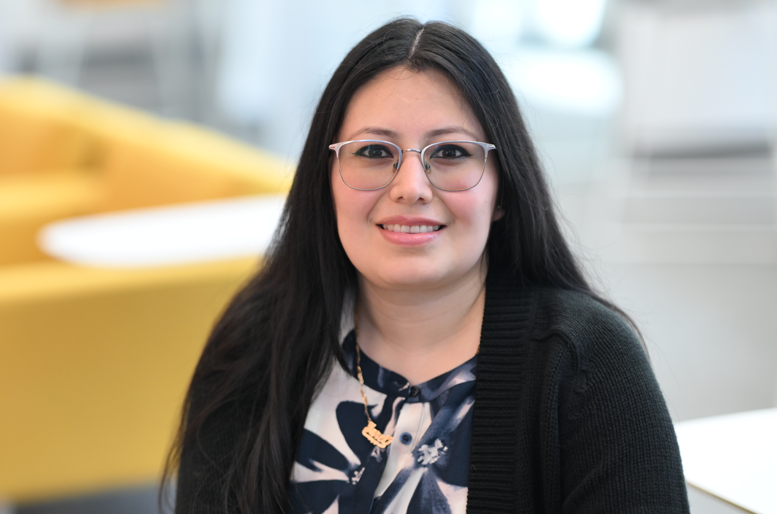Advocating for Underserved Latino Communities
The First in Her Family to Graduate College, NYSCAS Yaret Ruiz Empowers Spanish-Speaking Students for the NYC DOE

While New York School of Career and Applied Studies (NYSCAS) student Yaret Ruiz was born in the U.S., her father moved back to Mexico when she was just a toddler. To keep their family unit intact, her parents made the decision to return to their native country despite a lack of economic opportunities. Ruiz then returned to the U.S. as a pre-teen to live with her sister so she could have access to a better education system. Knowing little English, it was an uncomfortable learning experience compounded by bullying and feelings of loneliness. Now, she aims to help bilingual students in underserved communities who need an advocate to gain access to essential services, something she wishes she had as a child.
Congratulations on being the first in your family to pursue a bachelor's degree! Can you share a bit about what this accomplishment means to you personally?
Being raised in Mexico until I was 12 years old and then moving back to the United States was a radical change and I had a very hard time adjusting. Although my mother remained in Mexico after my father was deported, whenever we spoke, she always reinforced the importance of education and reminded me that without a degree, I wouldn’t be able to jumpstart my dream career. I cannot wait to have my mother watch me walk across the stage after receiving my degree and I know that this will be a very proud moment for both of us—like when I was able to get her a Green Card last year so she could be a permanent resident in the U.S.! I then plan to stay within the Touro University system and transfer to the Graduate School of Education to pursue my master’s degree in school counseling.
Where do you currently work and what are some of your responsibilities?
Currently, I work as a bilingual paraprofessional at the Department of Education’s Leaders High School in Brooklyn. Some of my responsibilities on a day-to-day basis include helping students with translation and reading, as well as working with students who have individualized education programs (IEPs). While I typically work with one student at a time, many other students regularly ask for my help as they feel more comfortable coming to someone who also speaks Spanish fluently. I wasn’t originally planning to work for the Department of Education, but once I was hired for this role, I realized that I could make a big difference in the lives of students who have stories that are similar to mine. Just listening to their issues can change how they view their educational experience overall and I enjoy forming relationships with my students.
When I first moved back to the U.S. to start middle school, we moved around a bit, from Chicago to New Jersey. While I lived in Chicago with my aunt, I was constantly bullied and became very shy and shut down completely. I couldn’t learn anything and was just surviving. However, after moving to Brooklyn, my teacher was half Spanish, so I was able to relate to him. He was also compassionate and understanding and he helped me to embrace being bilingual. He encouraged me to open up and make friends. That’s why I’ve stayed in New York after all these years as he made me feel like it was my home. I take pride in doing that for my students today.
What is your dream career and why?
My dream career is to be a school counselor to represent and help my Hispanic and Latino communities. There are still not enough teachers who look and sound like us, and I believe this is vital to connect on a deeper level with a growing demographic of students.
Could you highlight any challenges you've encountered on your journey to earn your bachelor's degree and how you've overcome them?
Even though Touro’s tuition is more affordable than many other schools, paying for college is still a struggle. Luckily, the Department of Education pays for 6-7 credits a semester while I pay the rest, which lessens my financial burden. Additionally, the number of assignments and tests each semester can be overwhelming, but I’ve found that planning ahead as much as possible is helpful, and breaking big projects into smaller more digestible pieces is key. My professors are always great at letting us know what assignments are coming up, so it gives me much-needed time to plan accordingly.
As someone who wants to advocate for supporting individuals in underserved communities as a school counselor, what changes or improvements are you hoping to make in both the educational and social welfare systems to better assist people in need of services?
Equal access to education for everyone is imperative, and my goal is to provide important resources and necessary support to bilingual individuals living in underserved communities. I also believe it’s crucial to ensure accessible services including mental health and general healthcare are readily available in an individual’s primary language. Over the years, students of Latino origin have increased, yet until recently I was the only one at my school who could help translate important messages to parents who don’t speak English. We need more translators in place everywhere as it helps to make parents comfortable, and it enables them to be more proactive when they know what is going on in their school district.

